|
|
|
Sort Order |
|
|
|
Items / Page
|
|
|
|
|
|
|
| Srl | Item |
| 1 |
ID:
110874


|
|
|
|
|
| Publication |
2012.
|
| Summary/Abstract |
The arguments presented here are based on a future scenario in which Iran has succeeded in developing nuclear weapons. Employing the logic and theory of deterrence, the article suggests ways in which the United States and its allies might counter, contain, and coerce nuclear Iran's sponsorship of terrorism and nonstate militant groups. Four strategic concerns are explored in particular: nuclear Iran may blackmail rival and neighboring states; shield an especially assertive foreign policy; protect its nonstate proxies and protégés; and facilitate nuclear terrorism. Deterrence theory is applied to each scenario.
|
|
|
|
|
|
|
|
|
|
|
|
|
|
|
|
| 2 |
ID:
160805
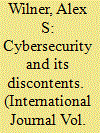

|
|
|
|
|
| Summary/Abstract |
The future of cybersecurity is in flux. Artificial intelligence challenges existing notions of security, human rights, and governance. Digital misinformation campaigns leverage fabrications and mistruths for political and geostrategic gain. And the Internet of Things—a digital landscape in which billions of wireless objects from smart fridges to smart cars are tethered together—provides new means to distribute and conduct cyberattacks. As technological developments alter the way we think about cybersecurity, they will likewise broaden the way governments and societies will have to learn to respond. This policy brief discusses the emerging landscape of cybersecurity in Canada and abroad, with the intent of informing public debate and discourse on emerging cyber challenges and opportunities.
|
|
|
|
|
|
|
|
|
|
|
|
|
|
|
|
| 3 |
ID:
134090
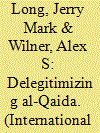

|
|
|
|
|
| Publication |
2014.
|
| Summary/Abstract |
Deterring terrorism is no longer a provocative idea, but missing from the contemporary theoretical investigation is a discussion of how delegitimization might be used to manipulate and shape militant behavior. Delegitimization suggests that states and substate actors can use the religious or ideological rationale that informs terrorist behavior to influence it. In the case of al-Qaida, the organization has carefully elaborated a robust metanarrative that has proved to be remarkably successful as a recruitment tool, in identity formation for adherents, as public apologia and hermeneutic, and as a weapon of war-the so-called media jihad. In the wake of the upheaval of the Arab Spring, al-Qaida and its adherents have redeployed the narrative, promising a new social order to replace the region's anciens régimes. Delegitimization would have the United States and its friends and allies use al-Qaida's own narrative against it by targeting and degrading the ideological motivation that guides support for and participation in terrorism.
|
|
|
|
|
|
|
|
|
|
|
|
|
|
|
|
| 4 |
ID:
102370
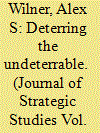

|
|
|
|
|
| Publication |
2011.
|
| Summary/Abstract |
This article argues that deterrence theory can be applied to counterterrorism. Doing so requires broadening the traditional concept of deterrence by punishment, expanding deterrence by denial to include defense, mitigation, and strategic hindrance, and developing deterrence by delegitimization to influence the political, ideological, and religious rationales informing terrorist behavior. In practice, deterring terrorism requires tailoring threats against state and individual facilitators, diffusing the intended consequences of terrorism, and manipulating terrorist self-restraints. When these and other deterrent leverages are applied simultaneously against various actors and processes involved in terrorism, coercion can be achieved.
|
|
|
|
|
|
|
|
|
|
|
|
|
|
|
|
| 5 |
ID:
185225
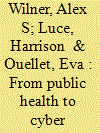

|
|
|
|
|
| Summary/Abstract |
The COVID-19 pandemic has ushered in a wave of cyberattacks targeting the healthcare sector, including against hospitals, doctors, patients, medical companies, supply chains, universities, research laboratories, and public health organizations at different levels of jurisdiction and across the public and private sectors. Despite these concerns, cybersecurity in Canadian healthcare is significantly understudied. This article uses a series of illustrative examples to highlight the challenges, outcomes, and solutions Canada might consider in addressing healthcare cybersecurity. The article explores the various rationales by which Canadian healthcare may be targeted, unpacks several prominent types of cyberattack used against the healthcare sector, identifies the different malicious actors motivated to conduct such attacks, provides insights derived from three empirical cases of healthcare cyberattack (Boston Children’s Hospital [2014], Anthem [2015], National Health Service [2017]), and concludes with lessons for a Canadian response to healthcare cybersecurity from several international perspectives (e.g., Australia, New Zealand, the UK, Norway, and the Netherlands).
|
|
|
|
|
|
|
|
|
|
|
|
|
|
|
|
| 6 |
ID:
095807
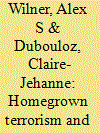

|
|
|
|
|
| Publication |
2010.
|
| Summary/Abstract |
Since 2001, a preponderance of terrorist activity in Europe, North America, and Australia, has involved radicalized Westerners inspired by al Qaeda. Described as 'homegrown terrorism', perpetrators are citizens and residents born, raised, and educated within the countries they attack. While most scholars and policy-makers agree that radicalization plays a central role in persuading Westerners to embrace terrorism, little research properly investigates the internal and cognitive processes inherent to radicalization. Transformative learning theory, developed from the sciences in education, health, and rehabilitation, provides an unconventional and interdisciplinary way to understand the radicalization process. The theory suggests that sustained behavioural change can occur when critical reflection and the development of novel personal belief systems are provoked by specific triggering factors. In applying transformative learning theory to homegrown terrorism, this study helps explain how formerly non-violent individuals come to condone, legitimize, and participate in violent behaviour.
|
|
|
|
|
|
|
|
|
|
|
|
|
|
|
|
| 7 |
ID:
095227
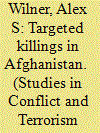

|
|
|
|
|
| Publication |
2010.
|
| Summary/Abstract |
This article examines the coercive and deterrent utility of targeting the leaders of violent, non-state organizations with precision force. Building on the literatures on targeted killings and deterrence theory, this article provides a case study analysis of targeted killings in Afghanistan. Relying on publicly available and semi-private sources, the article presents a comparative analysis of four targeted killings conducted against Taliban leaders. Findings suggest that the eliminations degraded Taliban professionalism, diminished the group's success rates, influenced their selection of targets, and weakened morale. These findings speak to the efficacy of targeted killings in counterterrorism and counterinsurgency and to their value as both counter-capability and counter-motivation operations.
|
|
|
|
|
|
|
|
|
|
|
|
|
|
|
|
| 8 |
ID:
106586
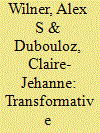

|
|
|
|
|
| Publication |
2011.
|
| Summary/Abstract |
While a consensus has emerged concerning the role radicalization plays in persuading Westerners to participate in terrorism, little research investigates the cognitive processes inherent to radicalization processes. Transformative learning theory, developed from the sciences in education and rehabilitation, offers an interdisciplinary lens with which to study the processes of personal change associated with radicalization. Transformative radicalization explains how triggering factors lead to critical reflection of meaning perspectives and personal belief systems that guide and alter behavior. Using an autobiographical account of the radicalization process, this study offers a plausibility probe of an inherently interdisciplinary and novel theoretical framework.
|
|
|
|
|
|
|
|
|
|
|
|
|
|
|
|
| 9 |
ID:
173808
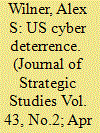

|
|
|
|
|
| Summary/Abstract |
When compared to advancements in conceptualising deterrence in other domains, cyber deterrence is still in it messy infancy. In some ways cyber deterrence practice outpaces cyber deterrence theory. Tactics, strategy, doctrine, and policy are developed and put to use even before corresponding theories are properly understood. This article analyses how American cyber deterrence has been implemented over the past two decades in order to inform ongoing debates within the academic study of deterrence, and to provide insights from practice for how cyber deterrence theory can be better conceived and refined.
|
|
|
|
|
|
|
|
|
|
|
|
|
|
|
|
|
|
|
|
|